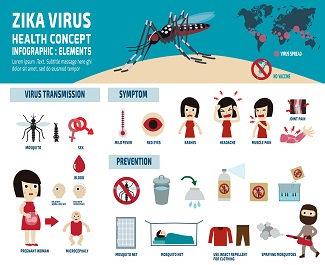On 6 September 2016, WHO updates guidance of prevention of sexual transmission of Zika virus. We highlight the important points of this updated guidance and reproduce part of the article here for your information.
Important Points of the update:
1. Pregnant women should practice safer sex or abstain from sexual activity for at least the whole duration of the pregnancy. Their partners should also be informed about this recommendation.
2. The recommended length of time for safer sex practices for asymptomatic males returning from areas with active Zika virus transmission was extended from 8 weeks to 6 months. This is the same length of time as is recommended for symptomatic males. This recommendation now also applies to females, whether or not they have had symptoms. The 6 months duration of safer sexual practice upon return has not changed.
2. Men and women also get counselling on safer sexual practices, and be offered condoms. The consistent use of condoms is essential to prevent sexually transmitted infections, including human immunodeficiency virus (HIV), and unwanted pregnancy.
3. Sexually active men and women be correctly counselled and offered a full range of contraceptive methods to be able to make an informed choice about whether and when to become pregnant, in order to prevent possible adverse pregnancy and fetal outcomes.
4. Women who have had unprotected sex and do not wish to become pregnant due to concerns about Zika virus infection have ready access to emergency contraceptive services and counselling.
5. Independently of considerations regarding Zika virus, WHO always recommends the use of safer sexual practices including correct and consistent use of condoms to prevent HIV, other sexually transmitted infections and unwanted pregnancies.
1. Background
This document is an update of guidance published on 7 June 2016 to provide advice on the prevention of sexual transmission of Zika virus.
The primary transmission route of Zika virus is via the Aedes mosquito. However, mounting evidence has shown that sexual transmission of Zika virus is possible and more common than previously assumed. This is of concern due to an association between Zika virus infection and adverse pregnancy and fetal outcomes, including microcephaly, neurological complications and Guillain-Barré syndrome.
This review comprises recent evidence on sexual transmission of Zika virus which includes sexual transmission from
- Asymptomatic males to their female partners,
- Symptomatic female to her male partner,
- Longer shedding of Zika virus in semen.
Based on this new evidence, the recommended length of time for safer sex practices for asymptomatic males returning from areas with active Zika virus transmission was extended from 8 weeks to 6 months. This is the same length of time as is recommended for symptomatic males. This recommendation now also applies to females, whether or not they have had symptoms. The 6 month duration of safer sexual practice upon return has not changed.
The current evidence on persistence of Zika virus in semen, its infectiousness and impact on sexual transmission remains limited. This guidance will be reviewed and the recommendations updated as new evidence emerges.
2. Sexual transmission of Zika virus
2.1 Current evidence
As of 26 August 2016, a total of 17 studies or reports have been published on sexual transmission of Zika virus, including the following:
• Seven studies on symptomatic male to female transmission
• One study on male to male transmission
• One study on female to male transmission
• Two studies on asymptomatic male to female transmission
• Four case-reports reported by International Health Regulations National Focal Points
• Two case-reports described through government/news media
In addition, eight studies have been published on the presence of Zika virus in semen
2.2 Modes of sexual transmission
Zika virus transmission by sexual intercourse was first suggested by Foy et al.2 Published in 2011, this study described the case of a male patient infected with Zika virus in south-eastern Senegal in 2008 who infected his wife via sexual intercourse upon return to the United States of America. Since then, and up to 26 August 2016, sexual transmission of Zika virus has been reported in eleven countries (United States of America, Italy, France, Germany, New Zealand, Argentina, Chile, Peru, Portugal, Canada, and Spain) and referred mainly to vaginal intercourse.
3. Interim recommendations
Based on growing evidence that Zika virus can be sexually transmitted, WHO recommends the following:
1. In regions with active Zika virus transmission, health programmes should ensure that
a. All people (male and female) with Zika virus infection and their sexual partners (particularly pregnant women) receive information about the risks of sexual transmission of Zika virus.
b. Men and women also get counselling on safer sexual practices, and be offered condoms. The consistent use of condoms is essential to prevent sexually transmitted infections, including human immunodeficiency virus (HIV), and unwanted pregnancy
c. Sexually active men and women be correctly counselled and offered a full range of contraceptive methods to be able to make an informed choice about whether and when to become pregnant, in order to prevent possible adverse pregnancy and fetal outcomes.
d. Women who have had unprotected sex and do not wish to become pregnant due to concerns about Zika virus infection have ready access to emergency contraceptive services and counselling.40
e. Pregnant women should practice safer sex or abstain from sexual activity for at least the whole duration of the pregnancy. Their partners should also be informed about this recommendation.
2. In regions with NO active Zika virus transmission health programmes should ensure that:
a. Men and women returning from areas where transmission of Zika virus is known to occur should adopt safer sex practices or consider abstinence for at least 6 months upon return to prevent Zika virus infection through sexual transmission.
b. Couples or women planning a pregnancy, who are returning from areas where transmission of Zika
virus is known to occur, are advised to wait at least 6 months before trying to conceive to ensure that possible Zika virus infection has cleared.
c. Sexual partners of pregnant women, returning from areas where transmission of Zika virus is known to occur, should be advised to practice safer sex or abstain from sexual activity for at least the whole duration of the pregnancy.
Note: WHO does not recommend routine semen testing to detect Zika virus. However, symptomatic or asymptomatic men could be offered semen testing after returning from areas where transmission of Zika virus is known to occur, according to country policy. Two tests performed at different days (e.g.one week interval) should be performed because of false negative results or intermittent shedding. However, more evidence is necessary to determine the exact interval between two tests.
3. Independently of considerations regarding Zika virus, WHO always recommends the use of safer sexual practices including correct and consistent use of condoms to prevent HIV, other sexually transmitted infections and unwanted pregnancies.
Subscribe to receive newsletter on pregnancy and parenting in Singapore.


